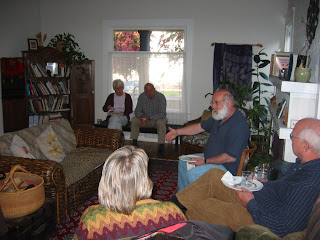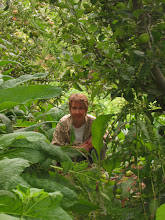Hi Everyone!
It has been a hectic last few weeks. Courtney and I re-frame by saying our lives are rich and full. After Jeff Halper came and went, I had hoped for a reprieve, but there's been none so far. Suddenly it's June and I see it's been since late April when I last blogged. How on earth could time go so fast?! There's so much to tell.
For now I'll begin by posting these two photos below of our dinner and time with Jeff on the afternoon of May 4th, before he spoke in public that evening at the Corvallis Library. We had about 115 people there for his talk. It lasted much longer than planned because people had so many questions and Jeff was willing to keep going. We raised $800 that night and another $500 at a fundraising/houseparty for him the next morning. So in many ways, including financially, it was a successful weekend. For the three weeks before, all I did was plan, plan, plan. So when it was over, whew......
PLUS Jeff stayed with us! Major thrill for me because he is such a hero in my eyes. It was fun to be able to spend some time with him away from the crowds of people wanting to talk with him, tell him their stories, hear his opinions on this or that. I could see how exhausting it must be to be a celebrity, even if it's just in the human rights realm. He maintained through it all a very approachable attitude, extended himself to everyone who wanted to talk, was warm and funny and very kind. A true warrior, in the best sense of the term.


Below is an article I wrote for the June issue of the Oregon PeaceWorker. It's exactly as it appeared in the paper. That should keep you all busy while I cook up the next blog enty.
Much love,
Valori
COUNTDOWN TO APARTHEID:
A public talk by Jeff Halper in Corvallis May 4, 2007
By Valori George
When Jeff Halper, co-founder and director of the Israeli Committee Against House Demolitions (ICAHD), describes the demolition of a Palestinian home, he speaks from first-hand experience. Jeff and others in ICAHD physically resist the demolitions--actions that call for immense courage--sitting in front of bulldozers and confronting Israeli soldiers.
The demolition of homes is not a new phenomenon in Israel, but began in 1948 when 400+ Palestinian villages were destroyed, to prevent refugees from returning and take the land for the new state of Israel. Since 1967, more than 18,000 Palestinian homes have been demolished in the Occupied Territories.
As an Anthropologist and one of the Israeli peace movement’s most vocal opponents to the Occupation, Jeff observes, on a very personal level, the enormous implications of a family losing their home. Often times only the mother and children are home when the soldiers and bulldozer arrive—in the worst cases, giving only 15 minutes notice, in the best cases, a couple of hours. In Arab culture a son can’t even marry until he has a home for his bride.
Under international law, house demolitions are illegal, a fact of which ICAHD repeatedly reminds Israeli officials. And, as an act of political resistance to the Occupation, ICAHD, using the labor of Israeli, Palestinian and international volunteers, rebuilds a home every summer in the village of Anata, outside of Jerusalem. Focusing on the injustice of house demolitions gives ICAHD a platform for talking about the broader context of injustices inherent to the Occupation.
In the Arab world, the Occupation is seen, Jeff emphasizes, as an American-Israeli occupation. It’s not just the use of American Apache helicopters and missiles, but also the common knowledge that the Israeli government could not sustain its occupation one month without the support of the U.S. In fact, Jeff observes that Israel portrays itself as a small America—a white, western, European country in dark and dangerous Arab lands.
Over forty years of occupation, as the conflict has assumed global significance, so has the role of international civil society. The Israeli government is not afraid of sanctions, because US government wouldn’t let that happen, but fears being seen as a major violator of human rights. Jeff advocates for reframing the conflict from one of Jewish victims of Arab terrorism to one of universal human rights—basic rights that apply to all, including those living under military occupation. Accordingly, all humans deserve full participation in their society (including economic participation), the right to be secure in their homes, to have freedom of movement.
Under the Occupation, Palestinians are systematically denied those rights. Through closures imposed since 1993 the Israeli government has actively de-developed the Occupied Territories—cutting off farmers from their orchards, confiscating the richest agricultural land, uprooting over 1 million olive and fruit trees, denying Palestinians engagement in commerce. Today 70% of Palestinians live on less than $2/day.
Through a Matrix of Control, as Jeff calls it, the Israeli government effectively restricts any freedom of movement for Palestinians. A maze of more than 600 checkpoints and blockades makes each Palestinian village an island, cut off from neighboring villages, a virtual prison. Additionally the new Separation Barrier, the 26-foot high concrete wall currently under construction, winds deep into Palestinian territory (not following the Green Line, but expropriating tens of thousands of acres from Palestinians), and further imprisons entire populations.
Today 60% of Palestinians are under the age of 18. What are their prospects?
Where is their hope? Jeff sees hope in the power of the international civil society.
We are at a critical point. Can we afford to allow a modern state to institute an apartheid system, a separation of populations in which one is permanently and completely dominant over the other? We said “no” to South African apartheid; what are the consequences if we, the international community, fail to say “no” to Israel?
Israel and the US are nation states and therefore subject to international law. The implications of allowing them to disregard international law and human rights are too dire—for the Palestinians, and for us all.
[Jeff Halper discusses possible solutions—one state, two states, or regional confederation—in his book Obstacles to Peace: A Re-framing of the Palestinian-Israeli Conflict. Also, the 40th anniversary of the Occupation will be marked by a rally/teach-in/lobby day on June 10th and 11th in Washington, DC, sponsored by the US Campaign to End the Israeli Occupation and United for Peace and Justice.]
Valori George is an anti-war activist living in Corvallis and working with the Corvallis-Albany Friends of Middle East Peace. She can be contacted at valgal@riseup.net.


<< Home